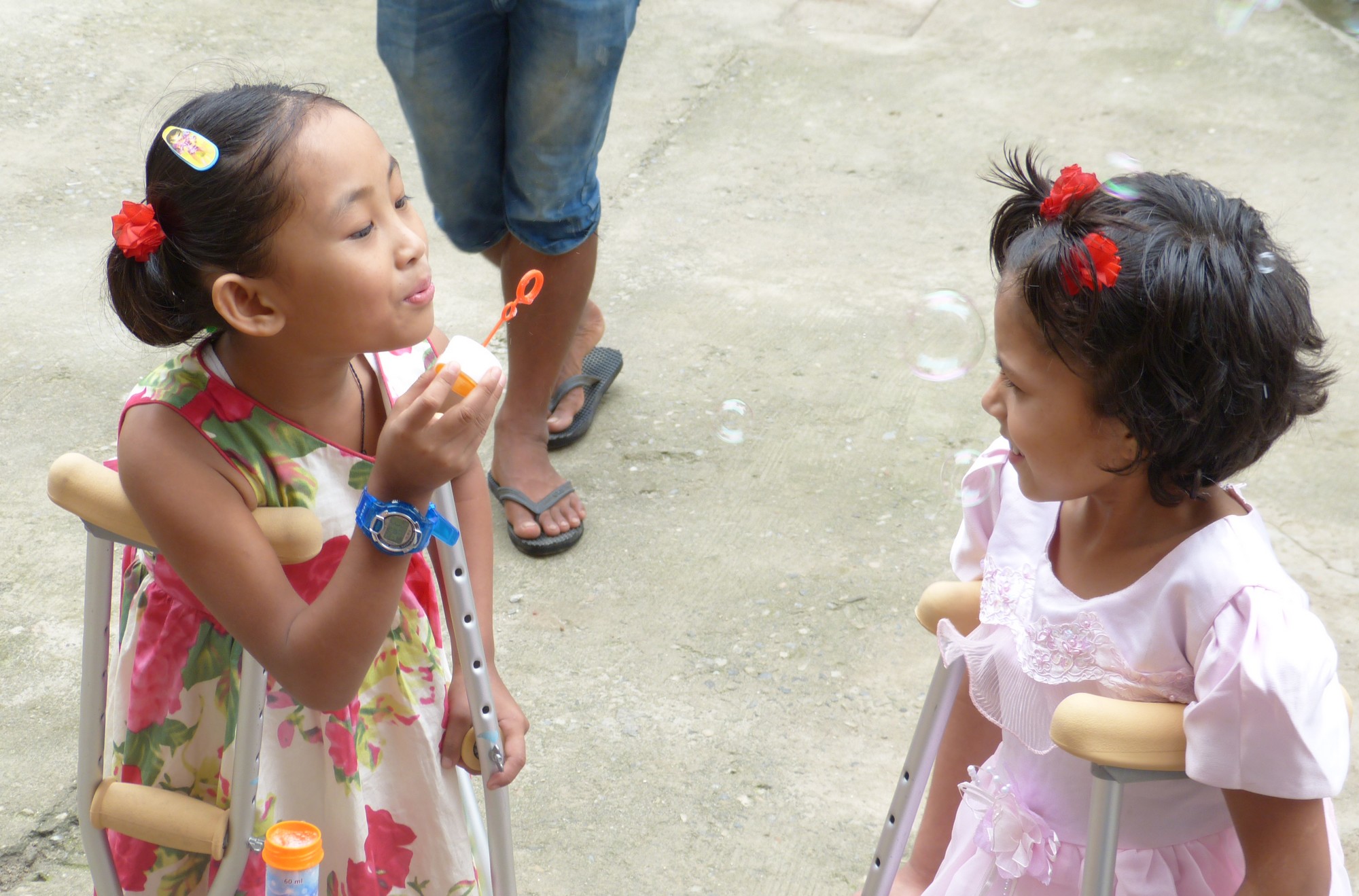Handicap International, which has worked in Nepal for 15 years, launched an immediate response in aid of people affected by the earthquake, drawing on its experience of case-managing earthquake victims and disaster preparation. Our field teams continue to provide long-term support to the most vulnerable.
Rehabilitation and psychosocial support sessions
Overwhelmed by the sheer number of injured people, hospitals quickly ran short of staff and medical equipment. Many required rehabilitation sessions, essential to prevent the development of permanent disabilities. Since 25 April, Handicap International’s physiotherapy teams have been case-managing patients, providing post-traumatic care, organising more than 10,500 rehabilitation sessions for over 4,000 patients, and distributing more than 2,300 mobility aids and special equipment (wheelchairs, crutches, walking frames, cervical collars and ergonomic mattresses) to more than 2,200 people affected by the disaster, both in Kathmandu and the worst affected districts.
The organisation has intervened in some twenty hospitals, medical infrastructures and permanent and mobile rehabilitation camps in communities in seven districts . The organisation has also organised group and one-to-one psychosocial sessions to help victims overcome their trauma.
Handicap International has set up a hotline for anyone who needs its services. The hotline is advertised on the radio along with locations of mobile rehabilitation camps.
Equipment for the most deprived
The number of homes destroyed or damaged was more than 600,000 and 280,000 respectively. To help families who had lost almost everything, Handicap International distributed more than 4,300 kits of essential non-food items (tents, cooking kits, hygiene kits and blankets). The organisation also distributed equipment to build corrugated roofs to protect over 2,200 families from monsoon rains in the districts of Rasuwa, Nuwakot and Kathmandou. In addition, 500 families of beneficiaries of rehabilitation sessions were given a returning home kit (basic medical supplies, blankets, cooking and hygiene equipment).
Logistics platform
Many people impacted by the earthquake live in isolated regions accessible only by foot or helicopter. The earthquake damaged roads, making access to these villages difficult.
Since 12 May, Handicap International has also been managing one of two humanitarian aid storage centres in Kathmandu, helping transport humanitarian aid to various village and community distribution points. Storage facilities have also been set up in the districts of Dhading (Dhading Besi Hub), Nuwakot (Bidur), Rasuwa (Shayphru Hub) and Kavrepalanchok (Banepa). Handicap International also transported humanitarian aid to distribution points in villages and communities. These storage and transport operations make the work of all NGOs in the field easier. A total of 201 trucks have been made available to other humanitarian operators.
Including the most vulnerable people
Many vulnerable people - pregnant women, victims of sexual and gender-based violence, older people and disabled people, and unaccompanied children - have been made even more vulnerable by this disaster. An estimated 2.8 million children have been affected, of whom 940,000 needed immediate support.
Handicap International’s inclusion technical unit works with humanitarian operators on the inclusion of vulnerable people. The organisation takes part in coordination forums, working groups and clusters (staff training, technical support) and in communities (training 157 community heads) and helps ensure all vulnerable people are able to access drinking water, education, health care and rehabilitation sessions.
Outlook
Almost six months after the earthquake, Handicap International is continuing with its rehabilitation and psychosocial support activities, identifying new patients, helping transport humanitarian aid and ensuring humanitarian operations are inclusive of the most vulnerable.
What’s more, Handicap International is building the capacities of rehabilitation centre teams to better meet patient needs.
Lastly, the organisation helps and provides technical support to the Ministry of Health so that physiotherapy services are included in the health system and new rehabilitation units are opened in districts affected by the earthquake. Handicap International also aims to ensure health facilities are prepared for future natural disasters.
 Kembro, 6, and Nirmala, 7 years, lost their legs after the earthquake of 25 April 2015. They follow physical therapy twice a day. © J. Mouton / Handicap International
Kembro, 6, and Nirmala, 7 years, lost their legs after the earthquake of 25 April 2015. They follow physical therapy twice a day. © J. Mouton / Handicap International


 Kembro, 6, and Nirmala, 7 years, lost their legs after the earthquake of 25 April 2015. They follow physical therapy twice a day. © J. Mouton / Handicap International
Kembro, 6, and Nirmala, 7 years, lost their legs after the earthquake of 25 April 2015. They follow physical therapy twice a day. © J. Mouton / Handicap International


